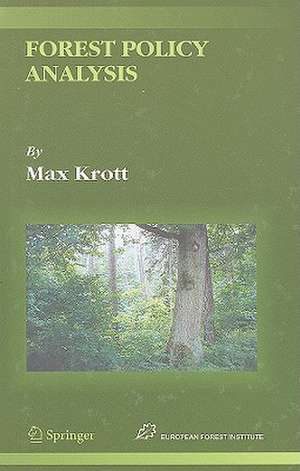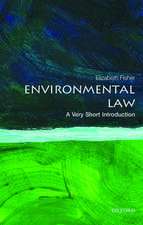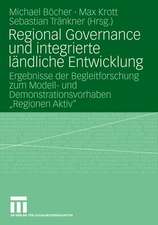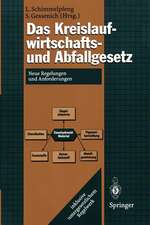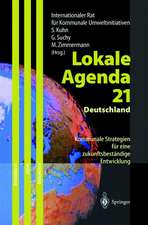Forest Policy Analysis
Autor Max Krott Traducere de R. von Paschenen Limba Engleză Hardback – 17 iun 2005
| Toate formatele și edițiile | Preț | Express |
|---|---|---|
| Paperback (1) | 1218.69 lei 6-8 săpt. | |
| SPRINGER NETHERLANDS – 19 oct 2010 | 1218.69 lei 6-8 săpt. | |
| Hardback (1) | 1225.94 lei 6-8 săpt. | |
| SPRINGER NETHERLANDS – 17 iun 2005 | 1225.94 lei 6-8 săpt. |
Preț: 1225.94 lei
Preț vechi: 1495.04 lei
-18% Nou
Puncte Express: 1839
Preț estimativ în valută:
234.58€ • 244.44$ • 194.23£
234.58€ • 244.44$ • 194.23£
Carte tipărită la comandă
Livrare economică 03-17 aprilie
Preluare comenzi: 021 569.72.76
Specificații
ISBN-13: 9781402034787
ISBN-10: 1402034784
Pagini: 336
Ilustrații: XII, 323 p.
Dimensiuni: 160 x 240 x 23 mm
Greutate: 0.68 kg
Ediția:2005
Editura: SPRINGER NETHERLANDS
Colecția Springer
Locul publicării:Dordrecht, Netherlands
ISBN-10: 1402034784
Pagini: 336
Ilustrații: XII, 323 p.
Dimensiuni: 160 x 240 x 23 mm
Greutate: 0.68 kg
Ediția:2005
Editura: SPRINGER NETHERLANDS
Colecția Springer
Locul publicării:Dordrecht, Netherlands
Public țintă
ResearchCuprins
Professionalization of Forest Sector Policy Making.- Interests and Conflicts in the Forest Sector.- Programs for Forest Protection and Utilization.- Forest Users: Owners, Workers & Employees, and the General Population.- Associations and Political Parties.- Government and Administration.- Informational Instruments.- Economic Instruments.- Regulatory Instruments.- Land-Use Planning.- Political System and Political Process.
Notă biografică
Professor Max Krott is director of the Institute for Forest Policy and Nature Conservation at the University of Göttingen, Germany. He is well experienced in forest policy throughout the whole of Europe. He explores the users of the forest and stakeholders comprised of forest owners, associations, political parties, government and administration. The analysis of the informational, economic and regulatory policy instruments covers the formal as well as the informal processes of policy formulation and implementation. The theory based results are highly relevant for forest policy in all European countries whereas the examples are drawn from Germany.
Textul de pe ultima copertă
The forest is within the focus of many old, many new and constantly changing interests of economy, society and politics. Concepts for sustained forests can achieve impact in practice only as far as they gain support of society and politics. Forest Policy Analysis advices how to mobilize support in order to make forest policy relevant.
This book gives an introduction in the methodology of social sciences. It is a guideline for all those who are interested in the use and protection of the forest. It shows how to identifying political options for solving issues of the forest. The book builds a bridge between the problems concerning forests to the political process.
Professor Max Krott is director of the Institute for Forest Policy and Nature Conservation at the University of Göttingen, Germany. He is well experienced in forest policy throughout the whole of Europe. He explores the users of the forest and stakeholders comprised of forest owners, associations, political parties, government and administration. The analysis of the informational, economic and regulatory policy instruments covers the formal as well as the informal processes of policy formulation and implementation. The theory based results are highly relevant for forest policy in all European countries whereas the examples are drawn from Germany.
This book gives an introduction in the methodology of social sciences. It is a guideline for all those who are interested in the use and protection of the forest. It shows how to identifying political options for solving issues of the forest. The book builds a bridge between the problems concerning forests to the political process.
Professor Max Krott is director of the Institute for Forest Policy and Nature Conservation at the University of Göttingen, Germany. He is well experienced in forest policy throughout the whole of Europe. He explores the users of the forest and stakeholders comprised of forest owners, associations, political parties, government and administration. The analysis of the informational, economic and regulatory policy instruments covers the formal as well as the informal processes of policy formulation and implementation. The theory based results are highly relevant for forest policy in all European countries whereas the examples are drawn from Germany.
Caracteristici
Only social science based textbook on Forest Policy (from the original German "Politikfeldanalyse Forstwirtschaft") Special emphasis on informal processes indispensable in understanding practical politics
